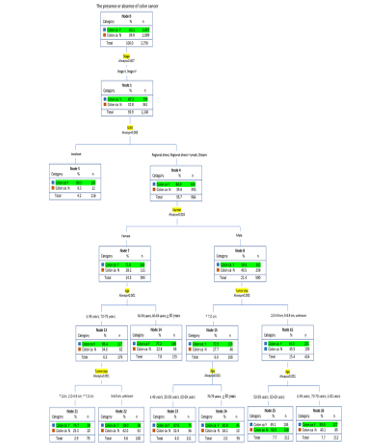Factors Affecting Colorectal Cancer in Korean: A Population-Based Study
Main Article Content
Abstract
This study aimed to classify the anatomical regions where colorectal cancer occurred into colon and rectum, to examine clinical characteristics, and to identify factors affecting colon cancer. The subject of this study was 2,756 cases of colorectal cancer in Korea registered in 2016. All data were analyzed using SPSS 23.0. In the clinical characteristics analyzed separately for colon cancer and rectal cancer, gender, age, morphology code (M-code), tumor size, distant metastasis, Surveillance, Epidemiology and End Result (SEER) stage, and cancer stage were statistically significant. Colon cancer was more common in women (65.6%) and rectal cancer was more common in men (43.6%) (p ˂ 0.001). The incidence of colon cancer was higher in patients aged 80 years or older and that of rectal cancer was higher in patients younger than 49 years of age (p ˂ 0.001). The results of logistic regression analysis showed that the incidence of colon cancer in female patients was 1.42 times (p ˂ 0.001) that in males. In comparison with the incidence in patients aged 49 years and younger, the incidence of colon cancer was 1.59 times (p = 0.002) in those aged 70 to 79 years and 1.95 times (p ˂ 0.001) in those aged over 80 years. The incidence of colon cancer was 18.14 times (p ˂ 0.001) higher in the absence of distant metastasis than in cases with distant metastasis. In comparison with the incidence of SEER stage localized disease, the incidence of regional disease (direct invasion + lymphatic invasion) was 0.17 times lower (p ˂ 0.001) and that of distant disease was 0.08 times lower (p = 0.001). In comparison with the incidence of stage 1 disease for colon cancer, the incidence of stage 2 disease was 1.56 times higher (p < 0.001), and that of stage 4 disease was 1.32 times higher (p = 0.026). In the predictive model of factors affecting the incidence of colon cancer, colon cancer stage sequentially affected SEER stage à gender à age and tumor size. Thus, although colon cancer and rectal cancer are anatomically classified as large intestine cancers, the clinical characteristics of both cancers are clearly different, and prophylactic, diagnostic, and therapeutic approaches for the two disease entities should differ accordingly.

